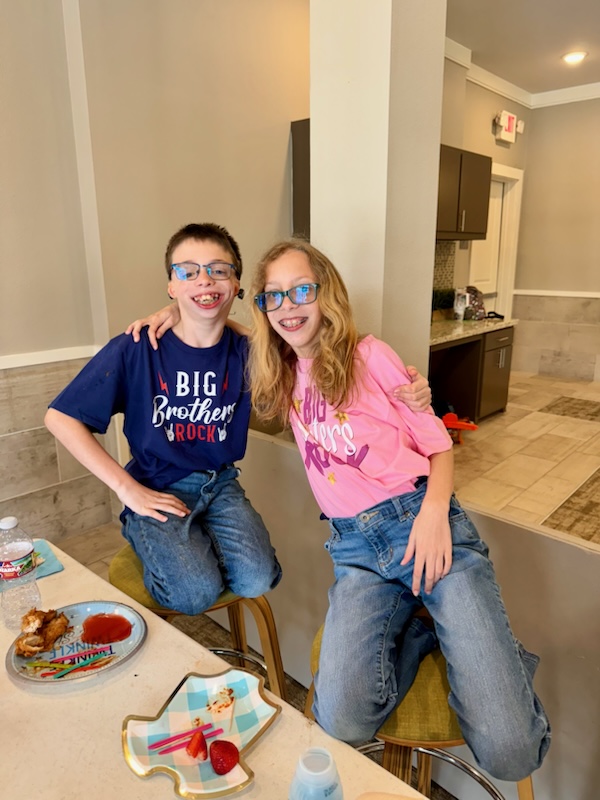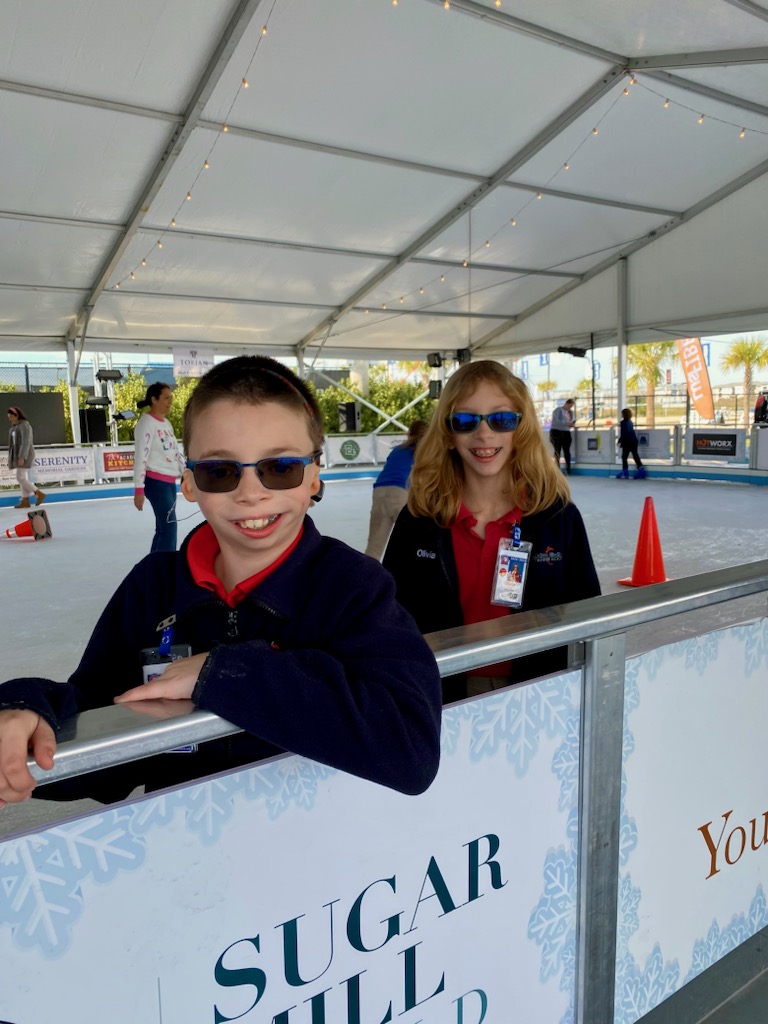Thriving with Treacher Collins syndrome: The Young family's legacy of strength and resilience
- Category: Patient Stories
- Posted on:

"In our family, we don't use the word 'normal,'" Emily Young explained, reflecting on the distinctive family culture shaped by their experiences with Treacher Collins syndrome (TCS). Along with her now-11-year-old twins, Lucas and Olivia, who also have Treacher Collins syndrome, Emily manages a life profoundly affected by this genetic condition that has run in her family since the 1800s.
Treacher Collins syndrome is not only present in Emily and her children but has also threaded through many generations of her ancestry. "My dad, aunts, uncles, cousins – we all share this condition," Emily said. Growing up in the 1980s and 90s, Emily faced numerous surgeries to address the craniofacial challenges posed by TCS, traveling from Paris to Houston, among other places, under the care of early specialists in the field. This extensive personal history shaped her decision to embrace motherhood, fully conscious of the genetic implications it carried.
"When parents discover their child has Treacher Collins, it's natural for them to react by wanting to fix things," she continued. "However, for us, living with TCS is all we know. It's our 'normal,' and Lucas and Olivia have grown up understanding that too. Every day since their birth has been a true blessing, largely thanks to the comprehensive care they've received at Children's Hospital New Orleans, which has been instrumental in helping us manage the challenges of TCS."
Understanding Treacher Collins syndrome
Treacher Collins syndrome is a genetic disorder characterized by deformities of the ears, eyes, cheekbones and chin. The condition is caused by mutations in various genes, which affect facial structure during early development in the womb. Individuals with TCS typically exhibit underdeveloped facial bones, notably the cheekbones and jawbones, which can lead to breathing and hearing difficulties. Other common features can include cleft palate, downward-slanting eyes and absent or unusually formed ears. 
Treacher Collins syndrome does not typically impact cognitive or mental development, which means children with this condition are usually fully aware of their surroundings and able to actively participate in most childhood activities. While these children often attend regular schools and can perform well academically, it's the broader milestones – like developing social skills, engaging in extracurricular activities and building friendships – that are equally significant. The visible differences in facial appearance may pose social challenges, such as dealing with questions from peers or feeling different, which necessitates a holistic approach to their care. This approach often balances medical treatment with strong support for their social and emotional well-being, ensuring they can lead fulfilling and well-rounded lives.
"Treacher Collins syndrome varies significantly in how it affects children, sometimes even among family members," said Dr. Gregory Fulton, a craniofacial pediatrician at Children's Hospital New Orleans, who oversees care for Lucas and Olivia. "Characterized by distinct facial anomalies that can complicate breathing, hearing and eating, the syndrome nonetheless allows for a robust quality of life when managed appropriately through modern surgical techniques and comprehensive supportive care." Dr. Fulton is the only fellowship-trained craniofacial pediatrician in the region.
For Lucas and Olivia Young, having a mom like Emily, who not only has thrived with TCS herself, but also works as a special education teacher, has provided them with a strong foundation of understanding and resilience. Emily uses her personal experiences and professional skills to create an environment where Lucas and Olivia can confidently navigate both the medical and social aspects of their condition, and that's been the case since their birth.
Emily's pregnancy and the twins' early days
Back in 2012, Emily's pregnancy was a time of detailed planning and monitoring due to the genetic risks associated with Treacher Collins syndrome. From the outset, she was told there was a 50/50 chance that each twin could inherit TCS. During the pregnancy, advanced 3D/4D ultrasounds revealed clear signs of TCS in Lucas, such as the absence of external ears and the distinctive slant of his jaw and eyes, while Olivia did not display any obvious indicators of the condition.
As the pregnancy progressed, Emily developed preeclampsia at 29 weeks, leading to an urgent medical situation. Due to the severity of her condition and the specialized needs of the twins, she was transferred from a local hospital in Lafayette to a more equipped facility in New Orleans. The twins were born prematurely via C-section in a critical environment, with Olivia weighing 1 pound 15 ounces and Lucas 2 pounds 3 ounces, both requiring immediate NICU care.
Lucas faced particularly severe challenges and was eventually transferred to the Level 4 Neonatal Intensive Care Unit at Children's Hospital New Orleans for specialized care after unfortunately acquiring a staph infection. His early days were marked by significant respiratory difficulties and the need for a ventilator, along with other complex, multidisciplinary medical interventions. Olivia, although less affected, also spent significant time under medical supervision in the NICU, staying for 2.5 months compared to Lucas's 4.5 months.
Their time in the Children's Hospital New Orleans NICU was vital in addressing their immediate medical challenges and setting the stage for ongoing care throughout their childhood. The hospital's NICU is known for its comprehensive care and state-of-the-art facilities, which provide a strong foundation for managing complex conditions like TCS. This phase of their lives highlights not only the medical complexities associated with TCS and premature birth, but also the need for a proactive approach that is essential for managing their condition.
Emily reflected on the important role played by the craniofacial team at Children's Hospital New Orleans, especially during Lucas' most worrisome early days. "I truly believe Lucas is with us today because of the rapid and expert response from the craniofacial team," Emily said. "We were told if we had waited just another day, it might have been too late. One of the physicians said that the amount of CO2 in Lucas' bloodstream was the highest he had ever seen in such a small baby, and yet, they managed to stabilize him. They placed a G-tube so he could eat and breathe without difficulty, which was essential for his recovery. Both kids were in the NICU for a long time, but the care they received there, especially Lucas, was nothing short of lifesaving."
Finally discharged from the NICU and back home, much of the work around managing Lucas and Olivia's TCS-related conditions would begin. Interestingly, although she displayed some early signs, Olivia's official diagnosis with TCS didn't come until she was a toddler, illustrating how the condition can manifest differently, even among twins.
Continued craniofacial care and development
As Lucas and Olivia grew throughout their childhoods, their care at Children's Hospital New Orleans has been primarily managed by the hospital's comprehensive craniofacial program, specifically designed to meet their diverse medical needs. For Lucas, the absence of external ears posed significant challenges in hearing, necessitating the use of bone-anchored hearing aids, which directly transmit sound vibrations to the inner ear through the bone. This innovative solution provided him with a functional alternative to traditional hearing aids, compensating for his lack of ear canals.
In addition to the auditory and craniofacial treatments, Lucas and Olivia have required extensive dental care to manage the crowding in their small jaws, a common issue with Treacher Collins syndrome. Both children have undergone multiple surgeries to remove excess teeth, facilitating better oral hygiene and preparing them for necessary orthodontic treatments to properly align their teeth. Lucas also underwent eye surgery at just one year old to correct weak eye muscles causing his eyes to drift, ensuring better visual alignment and coordination. These interventions highlight the comprehensive and adaptive care necessary to address the wide range of challenges faced by children with Treacher Collins syndrome. 
"Looking ahead, Lucas and Olivia are likely to require further surgeries and adjustments to their care regimen to enhance their quality of life as they mature," Dr. Fulton explained. "This will potentially include more advanced craniofacial reconstructive surgeries as they grow, continuous orthodontic treatments to manage the development of their jaws and teeth, and periodic updates to their hearing aids to adapt to their changing needs. Because children's facial bone structures evolve as they get bigger and go through puberty, there is a strategic consideration in timing these interventions to maximize their effectiveness and adapt to their developmental stages."
The holistic care strategy at Children's Hospital New Orleans is characterized by its attentiveness to both the immediate and long-term needs of children with Treacher Collins syndrome. By assembling a multidisciplinary team of specialists – including audiologists, orthodontists, craniofacial surgeons and speech therapists – the hospital ensures a coordinated and effective approach to each child's treatment. This support system not only addresses the medical aspects of the condition but also the social and emotional challenges that arise from visible differences and communication barriers. It is through this nurturing approach that Lucas and Olivia, supported by a dedicated team, continue to thrive and navigate the complexities of TCS with resilience and confidence.
A bright future ahead for the Young twins
Lucas and Olivia are now thriving in school, achieving impressive academic results and participating fully in class activities. Their success is greatly supported by the strong bond they share with each other and their mother; they rely on their tightly knit family for encouragement and understanding, navigating the social dynamics of preteen life with confidence.
Emily is committed to empowering Lucas and Olivia to eventually make informed decisions about their own care and surgeries, using her lifelong experience with Treacher Collins syndrome to guide them. "Given my personal experience with Treacher Collins and my role as a mother, I try to ensure they understand all aspects of their care," Emily added. "It's crucial for them to know they have options, especially regarding surgeries that may not be medically necessary but could enhance their quality of life." 
From Emily's perspective, and in partnership with their medical care team, her belief is that while some surgical interventions are critical, others remain optional and subject to their personal choice. For example, jaw surgery, including a procedure known as jaw distraction, is essential for Lucas. Jaw distraction helps gradually lengthen and reshape the jawbone, improving his ability to breathe and eat. On the other hand, surgeries like ear reconstruction or the fitting of prosthetic ears, which are more cosmetic, will be decisions she believes Lucas should make for himself when he's older.
Until then, Lucas and Olivia are getting ready to be a big brother and big sister – Emily is pregnant and due with baby number three in the summer of 2024. She plans to transfer her care to Children's Hospital New Orleans immediately if the baby inherits TCS, ensuring the best possible support from the start.
Amid these preparations, Emily offers heartfelt advice to other parents navigating similar paths: "Never think that your children aren't 'normal' – vacations can still happen; Disney World can still happen; friendships can still happen. It's crucial to advocate for your child's best interests, find strength in your community and trust in your care team. Remember, you are not alone, and there is a network of support out there. Most importantly, teach your children to embrace their unique qualities; these are what make them truly special. Embracing this mindset has been essential for us in enjoying our lives to the fullest, regardless of the challenges."
For families looking to understand more about Treacher Collins syndrome and the advanced craniofacial care available at Children's Hospital New Orleans, we invite you to download our Craniofacial Center brochure. Just like the Young family, we are here to support your family's journey, toward a supported, informed and hopeful future.



